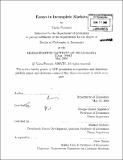Essays in incomplete markets
Author(s)
Panousi, Vasia
DownloadFull printable version (6.817Mb)
Alternative title
Essays on incomplete markets
Other Contributors
Massachusetts Institute of Technology. Dept. of Economics.
Advisor
George-Marios Angeltos and Mikhail Golosov.
Terms of use
Metadata
Show full item recordAbstract
This thesis studies the macroeconomics of incomplete markets. Chapter 1 studies the effects of capital taxation in a dynamic heterogeneous-agent economy with uninsurable entrepreneurial risk. Unlike either the complete-markets paradigm or Bewley-type models where idiosyncratic risk impacts only labor income, here it is shown that capital taxation may actually stimulate capital accumulation. This possibility emerges because of the general-equilibrium effects of the insurance aspect of capital taxation. Chapter 2, which is joint work with George-Marios Angeletos, revisits the macroeconomic effects of government consumption in the neoclassical growth model augmented with idiosyncratic investment (or entrepreneurial) risk. Under complete markets, a permanent increase in government consumption has no long-run effect on the interest rate, the capital-labor ratio, and labor productivity, while it increases work hours due to the familiar negative wealth effect. Under incomplete markets, the very same negative wealth effect now causes a reduction in risk taking and investment. This in turn leads to a lower risk-free rate and, under certain conditions, also to a lower capital-labor ratio, lower productivity and lower wages. Chapter 3 uses annual Greek data to test the validity of the Permanent Income Hypothesis (PIH) versus the "Keynesian" view that consumption responds to current income. The PIH is rejected by all tests, and so is the simple excess sensitivity hypothesis with a constant marginal propensity to consume. (cont.) Subsequently, the relevance of a more sophisticated excess sensitivity version, with a time-varying marginal propensity to consume, is determined. It is shown that liquidity constraints, in the form of the spread between private interest rates on loans and deposits, negatively affect the marginal propensity to consume out of current disposable labor income. This result disappears when total disposable income is considered.
Description
Thesis (Ph. D.)--Massachusetts Institute of Technology, Dept. of Economics, 2008. Includes bibliographical references (p. 99-104).
Date issued
2008Department
Massachusetts Institute of Technology. Department of EconomicsPublisher
Massachusetts Institute of Technology
Keywords
Economics.